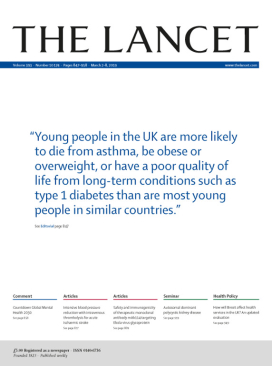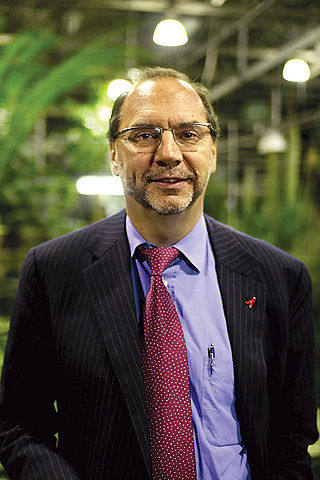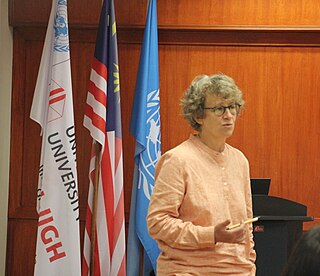Related Research Articles

The Lancet is a weekly peer-reviewed general medical journal and one of the oldest of its kind. It is also the world's highest-impact academic journal. It was founded in England in 1823.

Stanley Cohen was an American biochemist who, along with Rita Levi-Montalcini, was awarded the Nobel Prize in Physiology or Medicine in 1986 for the isolation of nerve growth factor and the discovery of epidermal growth factor. He died in February 2020 at the age of 97.

Sir Peter Karel, Baron Piot, is a Belgian-British microbiologist known for his research into Ebola and AIDS.
Diagnoses of autism have become more frequent since the 1980s, which has led to various controversies about both the cause of autism and the nature of the diagnoses themselves. Whether autism has mainly a genetic or developmental cause, and the degree of coincidence between autism and intellectual disability, are all matters of current scientific controversy as well as inquiry. There is also more sociopolitical debate as to whether autism should be considered a disability on its own.

Global health is the health of the populations in the worldwide context; it has been defined as "the area of study, research and practice that places a priority on improving health and achieving equity in health for all people worldwide". Problems that transcend national borders or have a global political and economic impact are often emphasized. Thus, global health is about worldwide health improvement, reduction of disparities, and protection against global threats that disregard national borders, including the most common causes of human death and years of life lost from a global perspective.
The Global Burden of Disease Study (GBD) is a comprehensive regional and global research program of disease burden that assesses mortality and disability from major diseases, injuries, and risk factors. GBD is a collaboration of over 3600 researchers from 145 countries. Under principal investigator Christopher J.L. Murray, GBD is based out of the Institute for Health Metrics and Evaluation (IHME) at the University of Washington and funded by the Bill and Melinda Gates Foundation.

Preventable causes of death are causes of death related to risk factors which could have been avoided. The World Health Organization has traditionally classified death according to the primary type of disease or injury. However, causes of death may also be classified in terms of preventable risk factors—such as smoking, unhealthy diet, sexual behavior, and reckless driving—which contribute to a number of different diseases. Such risk factors are usually not recorded directly on death certificates, although they are acknowledged in medical reports.
In epidemiology, environmental diseases are diseases that can be directly attributed to environmental factors. Apart from the true monogenic genetic disorders, which are rare, environment is a major determinant of the development of disease. Diet, exposure to toxins, pathogens, radiation, and chemicals found in almost all personal care products and household cleaners, stress, racism, and physical and mental abuse are causes of a large segment of non-hereditary disease. If a disease process is concluded to be the result of a combination of genetic and environmental factor influences, its etiological origin can be referred to as having a multifactorial pattern.

The Institute for Health Metrics and Evaluation (IHME) is a research institute working in the area of global health statistics and impact evaluation at the University of Washington in Seattle. The Institute is headed by Christopher J.L. Murray, a physician and health economist, and professor at the University of Washington Department of Global Health, which is part of the School of Medicine. IHME conducts research and trains scientists, policymakers, and the public in health metrics concepts, methods, and tools. Its mission includes judging the effectiveness and efficacy of health initiatives and national health systems. IHME also trains students at the post-baccalaureate and post-graduate levels.
Max Roser is an economist and philosopher who focuses on large global problems such as poverty, disease, hunger, climate change, war, existential risks, and inequality.

Oriol Mitjà i Villar is a Catalan-born Spanish researcher and consultant physician in internal medicine and infectious diseases with expertise in poverty-related tropical diseases. He has conducted research at the Lihir Medical Centre in Papua New Guinea since 2010 on new diagnostic and therapeutic tools to eradicate yaws. He was awarded the Princess of Girona Award in the scientific research category. Currently at the Germans Trias i Pujol Research Institute, Mitjà is conducting research on SARS-CoV-2 coronavirus disease (COVID-19) and strategies to control the infection at a community level.
Nyovani Janet Madise is the current Director of Research and Development Policy and Head of the Malawi office of the African Institute for Development Policy. She is an advisor to the World Health Organization and a former professor of the University of Southampton in Demography and Social Statistics. Nyovani has over 100 peer-reviewed research publications that focus on global health issues, to highlight the influence of social and economic factors on health in low-income countries.

Charlotte Helen Watts, is a British mathematician, epidemiologist, and academic. Since 2006, she has been Professor of Social and Mathematical Epidemiology at the London School of Hygiene and Tropical Medicine. She was also the Chief Scientific Advisor to the UK's Department for International Development from 2015 to 2020. Her research interests include HIV and gender-based violence.

Child development in India is the Indian experience of biological, psychological, and emotional changes which children experience as they grow into adults. Child development has a significant influence on personal health and, at a national level, the health of people in India.

Igor Rudan is a Croatian-British scientist, writer, and science communicator. He creates popular science books and documentaries.
Patrice Lee Engle was a developmental psychologist known as a pioneer in the field of global early childhood development and for her international work advocating for children's education and healthcare. She was Professor of Psychology and Child Development at California Polytechnic State University, San Luis Obispo.
Theodore Maxwell, MD (1847-1914) was an English doctor medical missionary, founder of the Kashmir Mission Hospital, and published author. Maxwell left England for Kashmir shortly after receiving his MB from King's College, Cambridge, and serving as a physician in Addenbrooke's Hospital. His arrival in Srinagar, Kashmir, succeeded four years of missionary work by Dr. William Jackson Elmslie. Maxwell founded a new hospital in Srinagar and laid the foundations for the work of his successors, including the establishment of the Kashmir Mission Hospital. After leaving missionary work, Maxwell wrote numerous papers for The Lancet and compiled important medical knowledge to write Terminologia Medica Polyglotta: A Concise International Dictionary of Medical Terms.
Joanne Katz is an epidemiologist, biostatistician, and Professor of International Health at the Johns Hopkins Bloomberg School of Public Health. She holds joint appointments in the Departments of Biostatistics, Epidemiology and Ophthalmology. Her expertise is in maternal, neonatal, and child health. She has contributed to the design, conduct and analysis of data from large community based intervention trials on nutritional and other interventions in Indonesia, Philippines, Bangladesh, Nepal and other countries.

Nina Schwalbe is an American public health researcher who is the founder of Spark Street Advisors, a public health think tank based in New York City. Schwalbe specializes in vaccines. She has previously worked at Gavi, UNICEF and USAID.
References
- 1 2 "Wachs, Th.D." Netherlands Institute for Advanced Study . Retrieved 2019-01-02.
- ↑ "Theodore Wachs '62". Muhlenberg College Alumni. Retrieved 2019-01-02.
- ↑ "Wachs, Theodore D., 1941-". Library of Congress . Retrieved 2019-01-02.
- 1 2 "Theodore Wachs Home Page". Purdue University . Retrieved 2019-01-02.
- ↑ Childs, Craig (2009-06-25). "Perfect Quiet". Pacific Standard . Retrieved 2019-01-02.
- ↑ "Won't You Be My Buddy?". Newsweek . 1997-02-28. Retrieved 2019-01-02.
- ↑ Carter, Julie A.; Pollitt, Ernesto; Wasserman, Gail A.; Lozoff, Betsy; Gardner, Julie Meeks; Wachs, Theodore D.; Walker, Susan P. (2007-01-13). "Child development: risk factors for adverse outcomes in developing countries". The Lancet. 369 (9556): 145–157. doi:10.1016/S0140-6736(07)60076-2. ISSN 0140-6736. PMID 17223478. S2CID 11120228.